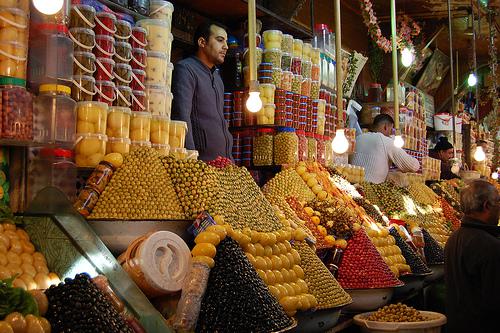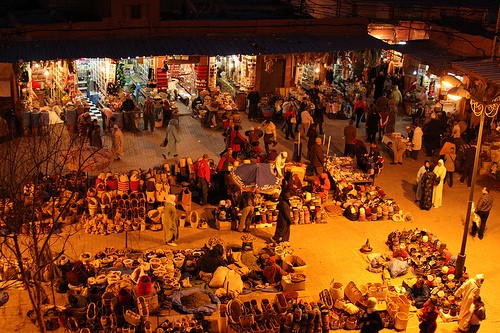Exotic Morocco is one of my favorite destinations when I need to leave behind the European rationality and modern way of living. It is incredible how close to Europe it is geographically and how far it is culturally speaking. It is a multinational society that consists of various ethnic groups with thousands of years of history and culture. In order to understand the country better, one visit won’t be enough, as one has to try a few of the various parts of the country and experience the cultural differences of all the distinct ethnic groups.
The main groups are:
1. The Berbers
2. The Arabs
3. The Tuareg
What is very common among all the aforementioned different ethnic groups is the way they do business. Most Westerners often disapprove the way the markets operate in Morocco purely because they cannot understand that different rules apply. In my mind, this is the real beauty of traveling, exploring new customs, trends and ways of life as there isn’t any right or wrong one.
At first, it seems there isn’t any logic in the bargaining, but there is. I know that many people don’t like it at all, but if you see it from a different perspective and forget for a minute about how things work “back home,” it can be an unforgettable and mentally challenging experience.
Markets in Marrakesh
Things to remember when bargaining:
1. Prices are irrelevant if they have any value at all. This is why it is unlikely to find anything with the price written on it. This also justifies the fact that bargaining the price is expected as it is the norm.
2. Asking for a price doesn’t mean that this is the price you have to pay to purchase it. In fact, it doesn’t mean anything at all. It is just the starting price of an auction where the final price and the starting one will be miles apart.
3. Don’t go away if the starting price is too high. What matters is how much YOU are happy paying and now how much you have been asked for.
4. Never forget that the economic difference between the Moroccan economy and that of Europe or the US is around the ratio of 1/10. That means that anything worth $1 or 1 Euro or £1 should sound in your ears the same as $10, 10 euro and £10 respectively. Ask yourself if back in your country you’d pay $10 for that item that is being offered to you for $1. If the answer is yes, then buy it. To reverse it, each time you hear the word Dirham, think of Dollar, Euro or GB pound.
5. Bargaining is not a shame. It’s just how it is, and any price you offer will be considered seriously and with respect even if it is miles away from the starting price. Never think you do not offer enough, as they will never get angry or offended no matter how low your offer is. Instead, they will try to make you pay more–that’s how the game goes!
Bargaining tips:
1. Know that nationality matters! Moroccans are very aware of the wealthy countries; therefore, Americans, Japanese, British, Germans and Scandinavians will have to pay more than South Africans, Spanish, Portuguese, Brazilians, Argentines, etc.

2. One of the first questions Moroccans make after guessing your nationality is where you have been in Morocco. Even if it is your first time/day there, don’t say so and just tell them you’ve been then several times and that you liked the X and Y places that you’re planning to visit later. Believe it or not, those questions set up the prices which are always much higher for newcomers. It took me a long time to decipher that, but it’s definitely the case.
3. Never buy anything straight after you’ve seen it. Normally, what you find in a shop you will find it in other shops too, so just express indifference and suggest a relatively low price as if not interested. The vendor’s response will give you an idea of the actual price.
4. If there is something you really like, do not show your intention directly. If you make it too obvious that you really like and want to buy something, the price won’t drop much. Start bargaining for two to three other items that don’t interest you at all, and then ask for the item you originally liked while you are leaving without being emotional.
5. Moroccans will try to sell you anything asking for euros, US dollars or even British pounds. This is a trick so everything will sound cheap. Insist on bargaining the prices in Moroccan Dirham instead. That will give you a better idea of the actual value of the purchased item as well as transmit the message that you haven’t just arrived in the country.
6. Always bargain about a single item even if you need more than one. Once you fix a price for one then that price can drop at least 25% for any additional item of the same kind.
A bargain example:
I really like that big, leather bag with a vibrant color. A guy further down the road had asked me for 350 dirham. In order to buy it I would do the following:
- Ask for the price of those leather sandals (100 dirham)
- Say that I am at the end of my holiday and don’t have much money
- You will be asked to make an offer, I’d offer 40 dirham (yes, less than half!)
- They would ask for 60-70
- I would decline their offer and ask for the price of a small leather bag (not the one I want yet)
- They will ask for 120 dirham
- I will offer the same 40 as before
- They would ask for 60-70 again (!)
- I would insist I cannot pay more than 40 as I’m leaving the country soon
- Price will go down to 50-60
- Then I will offer 50 for that big one I wanted since the very beginning
- Guess what, I will get the bag for between 60 and 70 dirham (with 250-350 Dirham starting price).
- Last attempt, I will offer 100 for two of those bags and if I make it clear that this is all I can offer it may work too.
Have you ever bargained in Morocco? Do you find these things to be true?






